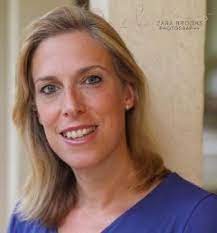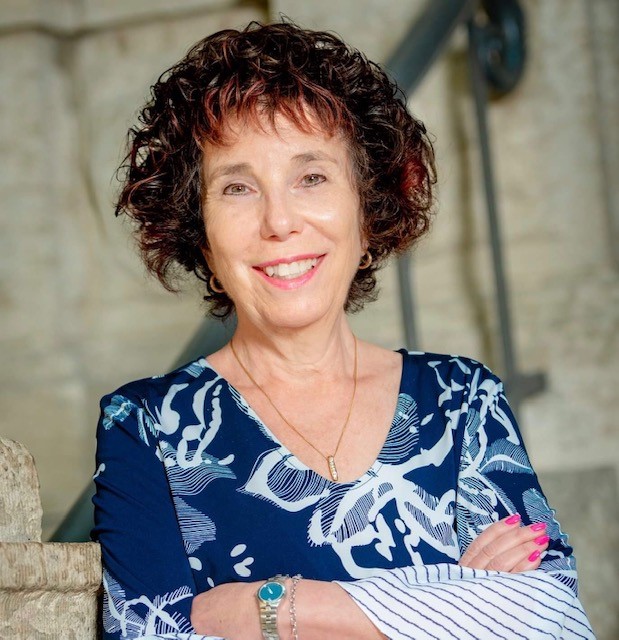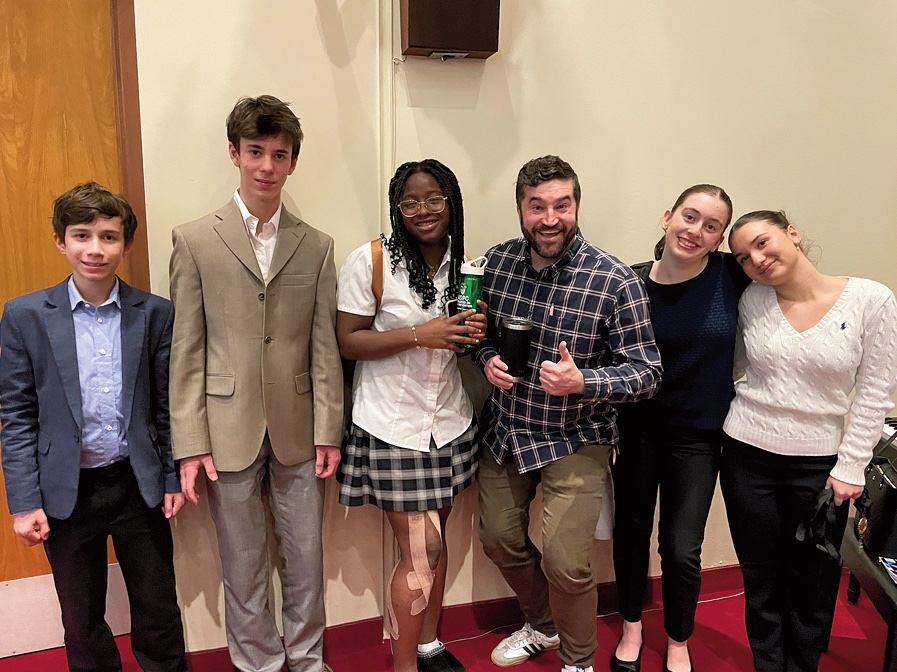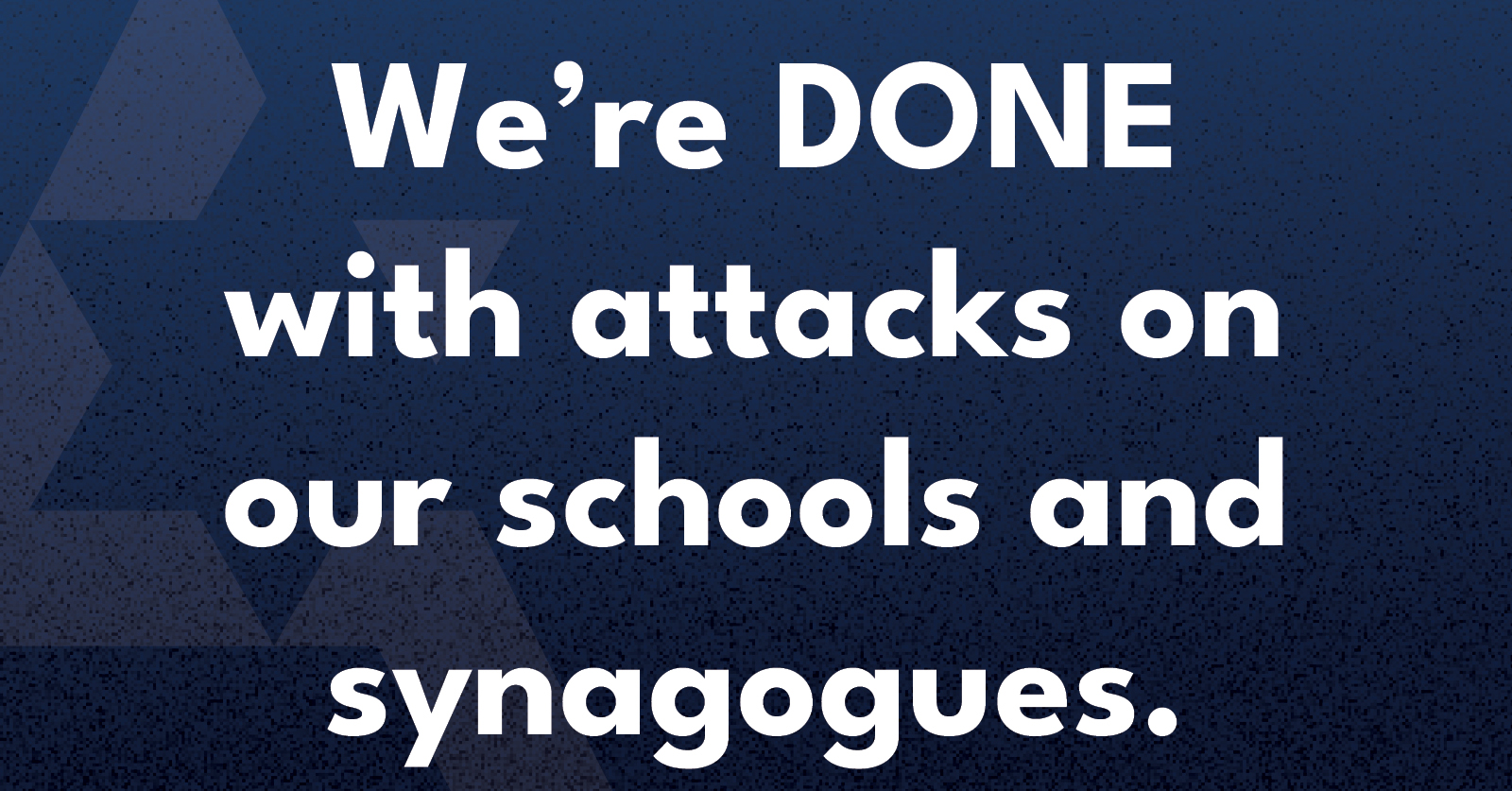Local News
Israeli representative in Canada Sarah Mali talks about October 7 heroes

By MYRON LOVE Conflict often produces acts of heroism – but it is not only warriors who become heroes. As Sarah Mali noted, heroism can come in many forms.
Mali, the Director General of JFC-UIA Canada in Israel, made a stop in our community on Thursday, May 30, on behalf of the Jewish Federation of Winnipeg, during which she did a presentation at the Berney Theatre providing an update on the situation in the Jewish State from her perspective as an Israeli – with a focus on the different faces of heroism..
The British-born Mali made Aliyah in 2000 after earning a degree from the London School of Economics. She also has degrees from the Hebrew University and the Harvard Kennedy School of Government. The mother of four – the older two currently serving in the Israel Defence Forces – was the Director of Israel Engagement for the Jewish Federation of Toronto from 2007 to 2012. She returned to Israel to undertake her current assignment in 2012 and now lives in Jerusalem.
Mali is an accomplished writer and public speaker who was named one of “50 of Our Favorite Women Right Now” by ”Future of Judaism” in 2022.
Mali was introduced by Paula Parks, the Jewish Federation of Winnipeg’s President. She presented her stories of heroism through a series of photographs. She began by recalling the first time in Israel that she heard sirens going off. “I was in the car with one of my daughters,” she recounted. “We weren’t quite sure what to do at first. But we got out of the car and did what all Israelis do.
“These past eight months, sirens have been sounded almost daily. Just recently, there was renewed rocket fire toward Tel Aviv.”
The first group of heroes that Mali highlighted was the group of 14 young female soldiers who were kidnapped from their IDF base near Kibbutz Nahal Oz – near the Gaza border – which was overrun on October 7.
She spoke of the 60,000 residents of Israel’s north who were forced to leave their homes because of the danger from Hezbollah in the north and the heroic way that their fellow Israelis throughout the country have opened their homes and hearts to these internally displaced refugees, along with survivors of the attacks by Hamas in the south.
While Mali noted that she and her family are safe – living in the centre of the country – she described a recurring nightmare of loss.
She told the story of Avitel Aladjem from Kibbutz Holit. When the kibbutz was attacked, Aladjem was tasked by her neighbor, Canadian-born Adi Vital Kaploun, with looking after the latter’s two children – a three year old boy and a baby. Kaploun was murdered and Aladjem and the children were put on bicycles and driven to the Gaza border. For some strange and miraculous reason, the terrorist left the threesome at the border. So Aladjem put the baby in a sling, picked up the three-year-old boy and carried both children back to safety.
Mali further praised the courage of the Magen David Adom medics who unhesitatingly put themselves in danger in those early desperate hours to save lives – and have continued saving lives throughout the war. She recounted one story about an Israeli soldier who was shot in the neck and pronounced dead. One medic, however, noticed that he was wearing a wedding band.
The medic noted that meant someone was waiting for the soldier at home and suggested the first responders should check him again for any vital signs. They found a pulse and had him evacuated by helicopter right away. He was able to make a full recovery.
(Mali also noted that more than 15,000 Israeli soldiers have been wounded in the current conflict.)
One of the photos that Mali put on screen was the rescuer visiting the recovering soldier in hospital.
She spoke of the tremendous efforts of Israeli mental health professionals who have been having to deal with tens of thousands of traumatized Israeli of all ages.
She noted the miracle of her own daughter recently giving birth – bringing a new life into a world gone mad.
Another photo she posted was of a letter from a seven-year-old girl in Toronto who wanted to donate $23 to Israel to help with food, clothing and housing.
Mali’s final paean was to all the Jewish communities in the Diaspora – including our own – that have raised tremendous sums of money (over $4 million alone from our community), have staged rallies in support of our Israeli brethren, and many of whom have travelled to Israel, not only to show their support, but also to volunteer to help in many ways.
“You are all heroes,” Mali told her audience.
Following her presentation, Mali took several questions from the audience. One question concerned the ongoing conflict with Hezbollah in the north. “My head tells me that the IDF has to end Hezbollah,” Mali responded. “But, as a mother with children serving in the IDF, I would be terrified.”
In answer to a second question about what some view as Israel’s poor public relations record, Mali pointed out that a major problem is that the Western media see the conflict – and the world – in terms of victims and oppressors, and the Palestiniand in this worldview are ever the victims – and therefore, can do no wrong – while the Israelis are the oppressors whose every actions are judged as criminal or evil.
In concluding, Mali described the strong sense of determination and solidarity among most Israelis – an attitude exemplified by her own 17-year-old son who is impatient to join the IDF and take up the fight.
She added that “We Israelis want you to come to Israel, hear our stories and share them back in your communities.
“Israel is a strong country with a strong army,” she observed. “We are fighting not just for our own people but also for all Jews – and we are fighting against evil. This is our moment.”
Local News
Cheryl Hirsch Katz, Jewish Child and Family Service’s longest serving staffer, set to retire at end of the month

By MYRON LOVE “I loved working at Jewish Child and Family Service,” says Cheryl Hirsh Katz, who is due to retire at the end of June. “I have always appreciated the warm and welcoming atmosphere here. I feel that the people working here are my extended family. I am going to miss my colleagues”.
“I have derived great satisfaction over the years to have been able to help many people in our community of all ages through my work at JCFS,” she continues.
After 44 years at the agency, Katz, the longest-serving member of the staff, was given an appreciative send-off at the JCFS’s recent (June 23) Annual General Meeting at the Shaarey Zedek Synagogue.
The daughter of Art and Bess Hirsh, Cheryl grew up in Garden City. She attended Peretz School, then Jefferson Junior High and Garden City Collegiate. She joined the staff of JCFS in 1981, shortly after receiving her Bachelor of Social Work degree.
She earned an MSW in 1990.
“I chose to become a social worker,” she recalls, “because I always wanted to be able to help people.”
Katz was originally hired by JCFS to work with newcomers. After a couple of years, she was given responsibility for looking after the needs of older adults.
“I really enjoyed working in older adult services,” she says. “That is where I spent the bulk of my time at JCFS.”
After ten years as a case worker, she was promoted to a supervisory role. Later, she was also given responsibility for mental health and addictions programming and settlement services, while keeping the older adult files under her purview.
“As a supervisor, I wasn’t directly involved with individual clients,” she points out. “I was more involved with programming. Among the programs for seniors we organized were – for example – sessions on elder abuse, digital storytelling and memory loss.”
She notes that one of the trends she has seen over the last 44 years is that people are living longer and living in their homes longer. A lot more of our clients are living well into their 90s,” she observes. “We have had to continually expand our staff and the services we provide in order to accommodate the growing demands of an aging population.”
She also spoke of the mental health needs of seniors and aging Holocaust survivors.
She says that she has mixed feelings about leaving JCFS. “After so many years working full time, I am going to have to create a new routine,” she comments.
She notes that, now that she is retired, she will have more time to spend with her parents – who are in their 90s.
And then, there are the two dogs to look after. “I will have time now to try new activities,” she says. “ I might learn to play mah-jong.”
She speaks about maybe doing some traveling – although her husband, Murray, is still working full time.
(She and Murray have one daughter, Farah.)
“Retirement may also include some volunteering,” she adds.
It is quite likely, she will be continuing her association with JCFS but in a volunteer capacity.
Local News
Gray Academy students shine in provincial, national debating competitions

By MYRON LOVE It has been another good year for Gray Academy’s high school students who participated in provincial and national debating competitions. The best results were recorded by Grade 9 student Noa Mednikov, who finished fourth overall nationally, fourth in interpretive reading, and fifth in persuasive speaking at the junior National Public Speaking Championship in early May in Vancouver.
Last October, in the Junior Provincial British Parliamentary Championship – which was held at St. John’s-Ravenscourt – Noa and her partner, Raya Braunstein, finished third as a team while Raya placed third in individual debating.
Their fellow Grade 9 student Maxim Moscalenkov tied for first in persuasive speaking in Vancouver, while the Gray Academy team of Gabe Tapper and Aaron Koplovich finished fifth. Aaron also finished fifth in his individual debate.
Earlier, in March, Maxim finished fifth in the Provincial Juniors debating competition, which was held at Balmoral Hall He and his debate partner, Nate Shenkarow, finished seventh among the teams entered. Last November, he and partner, Ethan Tenenbein, finished seventh in the Junior Prepared Tournament – just behind the Gray Academy team of Nate Shenkarow and Jack Kay.
At the senior high level in that competition, the team of Jacob Tenenbein and Jonah Novoseller finished fourth and Jacob was recognized as fifth best in an individual capacity. Jonah and Jacob also paired up to win the Asper Cup, which was held at their home school.
Jacob represented Manitoba at the Junior National Speech Championship in Vancouver in May and, last October, he and Grade 12 Gray Academy students Julie Krozkin and Daniel Bokser represented Canada at an international debating tournament in Bermuda.
Gray Academy’s debating program was introduced by Linda Martin in 2003. She also led the debating teams at Balmoral Hall. In 2011, Martin was succeeded by Gray Academy high school English teacher Andrew Kaplan.
“Andrew has done a wonderful job with the debating program” says Martin, who has a debating trophy at Gray Academy named in her honour, as well as a provincial trophy for best individual junior debater. “Over the years, Gray Academy students have done very well in many local, national and international competitions,” she adds.
About three weeks ago, this writer had the opportunity to sit down with Andrew Kaplan and six of the school’s top debaters while they discussed the benefits of learning how to debate. According to Noah Strauss – who competed in the Junior Provincials at Balmoral Hall in March, public speaking leaves him with a feeling of accomplishment.
“It’s a good skill set to have,” he observes. “It builds confidence.”
“A benefit of being able to debate is that you learn how to convince people that you know what you are talking about,” adds Maxim Moscolenkov.
Raya Braunstein notes that being able to debate is a skill that she expects to be helpful in many university courses which she may choose to take.
As Andrew Kaplan notes, the ability to express yourself has a great impact in whatever career you choose to pursue.
He points out that debating is compulsory at Gray Academy for all Grade 7 and 8 students – and students can continue debating as an option in the higher grades
Of course, competitive debating is not for everyone. For those students who opt to take that path, the journey begins with internal school debate competition – with the top debating teams and individuals qualifying for local tournaments and – potentially – beyond.
Andrew Kaplan reports that a small number of high schools in Winnipeg and southern Manitoba have active debating programs – including St. Johns Ravenscourt, St. Paul’s High School, St. Mary’s Academy, Garden City and Maples Collegiates in the Seven Oaks School Division, St. Maurice (a Catholic School), as well as Morden Collegiate and Dasmesh, a Sikh private school.
Kaplan expresses his appreciation to the Asper Foundation and an endowment spearheaded by the Kives Family for providing funding for the Gray Academy debating program – as well as the Andrew Slough Foundation – which was established by his friends in memory of the outstanding former Ravenscourt student debater and lawyer who passed away suddenly two years ago at the still young age of 38.
I am confident that our Jewish community can look forward to the continued success of Gray Academy’s star debaters and to the continual emergence of future stars as the times goes by.
Local News
Antisemitism has crept into grade school in Canada

Antisemitism in Canada has moved beyond protests and politics; it is now entering classrooms and altering how Jewish children see themselves functioning within them.
A a university student I have observed the experience of my younger brother in grade eight as a Jewish student. Over the past few months, his school has been at the center of several deeply troubling incidents that have made him feel unsafe in our parks, community, and even his school. Swastikas were drawn around the community, in parks and ponds. Additionally, an older man, who claims to be a pro-Palestinian influencer, stood outside his predominantly Jewish school wearing a keffiyeh, filming a video which then circulated between students on TikTok.
This same man later showed up to our local Jewish community center in keffiyeh to allegedly watch his son play basketball where my brother and many of his classmates go for their lessons, basketball games, and Jewish events. These moments made him and his peers feel watched and targeted just for being Jewish. Local political representatives condemned the incidents and raised awareness about antisemitism, but the fear among students didn’t go away. The feeling of being targeted for simply existing has been taught to my brother, something my parents had tried their hardest to escape from.
Most recently, my brother was chosen to represent his school at a regional science fair. When one of the judges arrived wearing a keffiyeh, he froze. For many, including my brother after the incidents he has faced, the keffiyeh represents a political message. But even more so for my younger brother, it is tied to the fear and intimidation he had already experienced. He felt nervous, distracted, and unsure of how to act.
This is not about silencing political expression. It is about a child who came to share his ideas and left feeling uncertain and afraid. It is about the atmosphere forming in Canadian schools, where Jewish students are being made to feel targeted and unwelcome.
His school made an effort to address the incidents, but the impact is lasting. Posts on social media, much can be very vague at times about inclusion cannot fully undo the feeling of being singled out. A kind word from a teacher does not erase the fear that builds when threats are left unspoken but deeply felt.
I am writing this as a sister who watched her younger brother lose a moment that should have been filled with confidence and pride. He deserved to feel safe. So do all Jewish students in this country.
Moving forward, schools must take concrete steps to protect all students. Antisemitism cannot only be addressed when it becomes violent or overt. It must also be recognized when it appears as intimidation, symbolic targeting, or political messaging that creates fear among students. Children should never have to question whether they are safe in their own classrooms or community spaces.
Events that are meant to support and celebrate students must remain focused on them. Individuals who feel the need to bring political symbols or messages into school grounds or children’s events should not be welcomed in those spaces. Schools must make it clear that their environments exist to support learning, safety, and inclusion, not to host agendas that can intimidate or isolate students.
Administrators and educators must develop clear guidelines for identifying and responding to antisemitic behavior in all its forms. This includes strengthening security measures, offering ongoing staff training, and engaging directly with Jewish families to understand their concerns. Inclusion is not a one-time statement. It is a responsibility that must be reflected in everyday decisions and actions. No child should ever feel unsafe or unwelcome because of their identity.
The author is a Campus Media Fellow with HonestReporting Canada and Allied Voices for Israel who lives in Toronto.


